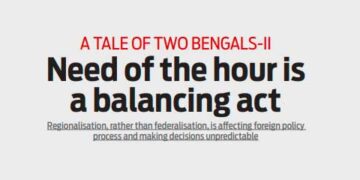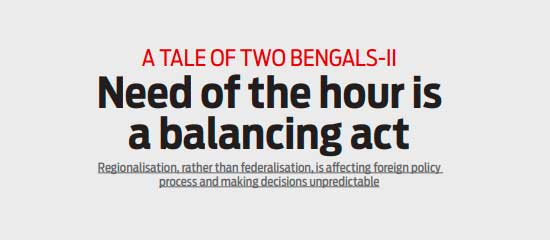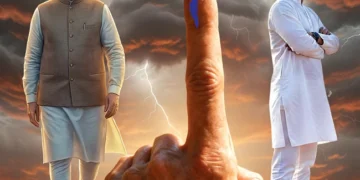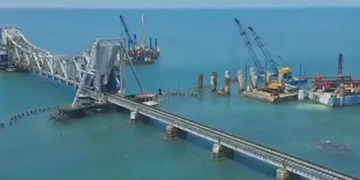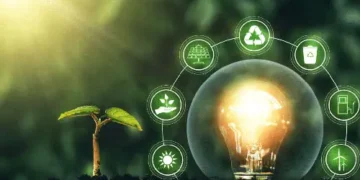 CONSTITUTIONALLY speaking, foreign policy is the exclusive domain of the Central Government. The primary institutions for framing and implementing foreign policy are the External Affairs minister, the bureaucracy attached to the ministry, and the Prime Minister and his office.
CONSTITUTIONALLY speaking, foreign policy is the exclusive domain of the Central Government. The primary institutions for framing and implementing foreign policy are the External Affairs minister, the bureaucracy attached to the ministry, and the Prime Minister and his office.
The Centre can declare war, conduct relations with foreign nations and international organisations, appoint and receive diplomatic and consular officials, conclude, ratify, and implement treaties, and acquire or cede territory. No wonder why, soon after Independence, all major treaties that India had entered into with other countries were never discussed or debated in Parliament in advance, let alone state governments being briefed about them. However, things are now changing, particularly in the ‘border states’. Leaders here have forced the Central Government to include the concerns of the states’ people in dealings with the neighboring country. Foreign policy is thus being conditioned accordingly and getting ‘federalised’.
Regionalisation, rather than federalisation, is affecting foreign policy process and making decisions unpredictable
Border states fallout
India borders Pakistan, China, Bangladesh, Myanmar, Sri Lanka and Maldives. In effect, what this means is that any development in each of these countries has its fallout on the contiguous Indian states. It so happens that most of the important regional parties that govern the border states have important concerns with the neighbouring countries that are different from the concerns seen from New Delhi. See how Jammu and Kashmir looks at Pakistan, West Bengal looks at Bangladesh, and Tamil Nadu looks at Sri Lanka.
Incidentally, an opposition parliamentarian, George Fernandes, on March 5, 1993, had given notice of intention to introduce a Constitution (Amendment) Bill for amending Article 253 to provide that treaties and conventions be ratified by each House of Parliament by not less than one half of the membership of each House and by a majority of the legislatures of not less than half the states. However, the Bill was not listed for consideration during the life of that Lok Sabha.
Prior to that, in February 1992, MA Baby, a Rajya Sabha member, had also given a similar notice. His Bill came up for discussion in the Rajya Sabha only in March 1997. However, it did not go beyond the discussion stage.
It is important to note that during the discussions, former Congress leader Pranab Mukherjee (who subsequently became the President), had strongly argued as a Congress lawmaker in favour of ‘the Executive’ (the Central Government) retaining its primacy in treaty-making.
He had pointed out that if parliamentary approval would be mandatory for the conclusion of all treaties, then given the divisive nature of the polity, no important and sensitive treaties, such as the water-sharing treaties with Nepal and Bangladesh and World Trade Organisation (WTO) agreements could ever have received India’s accession. He had only conceded that Parliament could have informed debate and discussion on the relevant provisions of the treaty but without any power to veto it.
Be that as it may, over the last few years, there have been enough instances that underscore the fact that states or provinces are clamoring for bigger roles in external relations, which were hitherto the exclusive preserve of the Central Government.
The POSCO example
After all, when one talks of globalisation and the consequent interconnectedness between the peoples of various regions of the world, the state governments do get concerned if the people of the states are adversely affected by the impact of globalisation, particularly in the areas of agriculture, setting up foreign industries, allowing multi-band retail, nuclear projects, and resource-sharing.
There is that burning example of the ignominious end of the South Korean giant POSCO’s plan to build a $12-billion steel plant in the eastern state of Odisha – India’s largest foreign direct investment project – following the state Government’s suspension of the land acquisition for this project in the face of opposition from the people of this iron-ore rich region who would have been displaced because of the industrial project.
Whether the growing federalisation of foreign policy is good or not depends on many variables. By its very nature, the term ‘federalisation’ presupposes a balance of political forces between the inherent tendencies of parliamentary centralisation and federal decentralisation. But what is happening is that there is more ‘regionalisation’ than proper ‘federalisation’, affecting the normal foreign policy process and making decisions unpredictable. And that is not good for the country as India’s economy grows and its integration with the global economy becomes more important. Therefore, many foreign policy experts agree that the need of the hour is a balancing act. Whether PM Modi succeeds in meeting this challenge remains to be seen.
